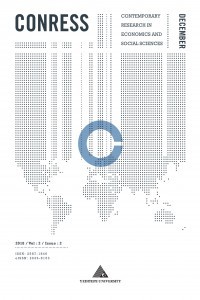Terrorist Attacks in Europe and Turkey: Securitization of Turkey in the 8 th European Parliament Plenary Debates
Terrorist Attacks in Europe and Turkey: Securitization of Turkey in the 8 th European Parliament Plenary Debates
This article focuses on the statements given by the members of the European
Parliament (MEPs) about Turkey during the Plenary Sessions about terrorism during the Eight
European Parliament. This study argues that during the period between 2014 and 2019,
Turkey’s otherness has been reinforced and discursively constructed especially by the right-
wing populist political party groups. By doing so, we’ve utilized the Securitization Theory of
Copenhagen School as our framework in which security is defined as a product of speech act.
The statements from the MEPs were categorized as positive or negative statements. Then,
these data were analyzed in detail to see if there are significant differences between the
discourses of different political groups in the European Parliament on Turkey.
Keywords:
Securitization, Copenhagen School, European Parliament terrorism, Turkey,
___
- Akgül-Açıkçeşme, S. (2011). Algı mı, Söylem mi? Kopenhag Okulu ve YeniKlasik Gerçekçilikte Güvenlik Tehditleri. Uluslararası İlişkiler, 8(30), 43-73.
- Buzan, B., Wæver, O., & Wilde, J. D. (1998). Security A New Framework for Analysis. Lynne Rienner Publishers: London.
- Celso, A. N. (2015). The Islamic State and Boko Haram: Fifth Wave Jihadist Terror Groups. Orbis, 59(2).
- Düzgit, S. A. (2015). European parliament “doing” Europe: Unravelling the right-wing culturalist discourse on Turkey’s accession to the EU. Journal of Language and Politics, 14(1), 154-174.
- Euractiv. (2014). Parliament elects ‘politically ecumenical’ Juncker as Commission President. Retrieved from Euractiv: https://www.euractiv.com/section/eu-elections-2014/news/parliament-elects-politically-ecumenical-juncker-as-commission-president/
- European Parliament. (2015). 28 January 2015 - Anti-terrorism measures (debate). Retrieved from European Parliament: https://www.europarl.europa.eu/doceo/document/CRE-8-2015-01-28-ITM-012_EN.html
- European Parliament. (2016). 12 April 2016 - Counterterrorism following the recent terrorist attacks (debate). Retrieved from European Parliament: https://www.europarl.europa.eu/doceo/document/CRE-8-2016-04-12-ITM-009_EN.html
- European Parliament. (2016). 21 January 2016 - Increased terrorism threat (debate). Retrieved from European Parliament: https://www.europarl.europa.eu/doceo/document/CRE-8-2016-01-21-ITM-004_EN.html
- European Parliament. (2016). 22 June 2016 - Preventing radicalisation leading to violent extremism and terrorism (debate). Retrieved from European Parliament: https://www.europarl.europa.eu/doceo/document/CRE-8-2016-06-22-ITM-017_EN.html
- European Parliament. (2016). 8 June 2016 - Improving data sharing and the use of European information systems and databases in the fight against serious transnational crime and terrorism (debate). Retrieved from European Parliament: https://www.europarl.europa.eu/doceo/document/PV-8-2016-06-08_EN.html
- European Parliament. (2016). Freeze EU accession talks with Turkey until it halts repression, urge MEPs. Retrieved from European Parliament: https://europarl.europa.eu/news/en/press-room/20161117IPR51549/freeze-eu-accession-talks-with-turkey-until-it-halts-repression-urge-meps
- European Parliament. (2018). 1 March 2018 - Cutting the sources of income for Jihadists - targeting the financing of terrorism (debate) . Retrieved from European Parliament: https://www.europarl.europa.eu/doceo/document/CRE-8-2018-03-01-ITM-004_EN.html
- European Parliament. (2018). 11 December 2018 - Findings and recommendations of the Special Committee on Terrorism (debate). Retrieved from European Parliament: https://www.europarl.europa.eu/doceo/document/CRE-8-2018-12-11-ITM-013_EN.html
- European Parliament. (2020). European Parliament Plenary. Retrieved from European Parliament: https://europarl.europa.eu/plenary/en/home.html
- European Parliament. (2020). European Parliament timeline. Retrieved from European Parliament: https://europarl.europa.eu/infographic/european-parliament-timeline/
- European Parliament. (2020). The Political groups of the European Parliament. Retrieved from European Parliament: https://europarl.europa.eu/about-parliament/en/organisation-and-rules/organisation/political-groups
- European Parliament. (n.d.). Welcome to the European Parliament . Retrieved from European Parliament : https://www.europarl.europa.eu/about-parliament/en
- Europol. (2018). European Union Terrorism Situation and Trend Report (TE-SAT) 2018.
- Europol. (2019). European Union Terrorism Situation and Trend Report (TE-SAT) 2019.
- Fairclough, N., & Wodak, R. (1997). Critical Discourse Analysis. In T. A. Dijk, Discourse as Social Interaction (pp. 258-284). London: SAGE Publications Ltd.
- Kaya, A. (2018). Right-wing populism and Islamophobism in Europe and their impact on Turkey–EU relations. Turkish Studies, 1-28.
- Lavenex, S., & Schimmelfennig, F. (2013). Democracy Promotion in the EU’s Neighbourhood: From Leverage to Governance? London: Routledge.
- Leonard, S., & Kaunert, C. (2011). Reconceptualizing The Audience In Securitization Theory. In T. Balzacq, Securitization Theory How Security Problems Emerge and Dissolve. New York: Routledge.
- Ministry of Foreign Affairs of the Republic of Turkey. (2017). What Happened on July 15th? Retrieved from July 15th 2016 - People's Victory: http://15.07.gov.tr/#timeline
- Ocal, N., & Yıldırım, J. (2010). Regional effects of terrorism on economic growth in Turkey: A geographically weighted regression approach. Journal of Peace Research, 47(4), 477-489.
- Rapoport, D. C. (2004). The Four Waves of Modern Terrorism. In J. L. Audrey Cronin, Attacking Terrorism: Elements of a Grand Strategy (pp. 46-73). Washington, D.C.: Georgetown Univ. Press.
- Republic of Turkey Ministry of Foreign Affairs. (2020). History of Turkey-EU Relations. Retrieved from Republic of Turkey Ministry of Foreign Affairs Directorate for EU Affairs: https://ab.gov.tr/111_en.html
- Saatçioğlu, B. (2019). The European Union’s refugee crisis and rising functionalism in EU-Turkey relations. Turkish Studies, 21(2), 169-187.
- Türkeş-Kılıç, S. (2018). Avrupa Komşuluk Politikası'nda Uluslararası Göçün Güvenlikleştirilmesi. Mukaddime, 9, 1-20.
- Türkeş-Kılıç, S. (2019). Justifying privileged partnership with Turkey: an analysis of debates in the European Parliament. Turkish Studies, 21(1), 29-55.
- The Institute for Economics and Peace. (2016). Global Terrorism Index 2016.
- Wæver, O. (1995). Securitization and Desecuritization. In R. Lipschutz, On Security (pp. 46-86). New York: Columbia University Press.
- ISSN: 2587-1846
- Başlangıç: 2017
- Yayıncı: Yeditepe Üniversitesi
